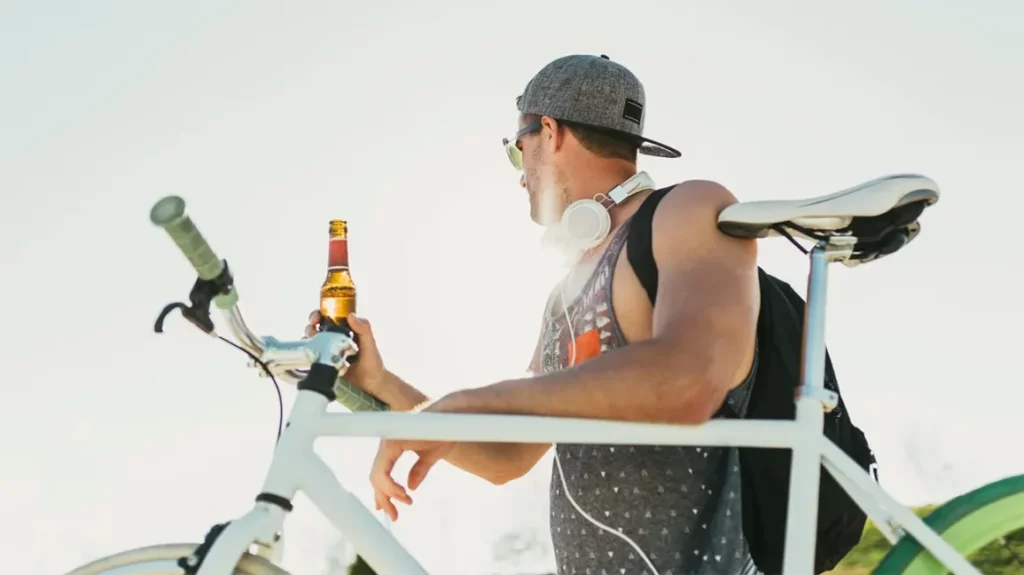Can you get a DUI on a bike in Arizona?
This article explores the legalities surrounding whether one can get a DUI while riding a bike in Arizona.
As laws and interpretations vary, this guide aims to provide clarity and insight into the current legal landscape, drawing from various sources to present a comprehensive understanding.
Can you get a DUI on a bicycle in Arizona?
In Arizona, you typically cannot be charged with a DUI on a non-motorized bicycle, but motorized bicycles may fall under DUI regulations.
The Definition of DUI in Arizona
Statutory Interpretation
In Arizona, the definition of Driving Under the Influence (DUI) is rooted in the state’s statutory framework.
The statutes specify that DUI offenses pertain to individuals who are in control of a “motorized vehicle” while under the influence of alcohol or drugs.
This legal definition plays a crucial role in understanding the applicability of DUI laws to different modes of transportation.
When it comes to bicycles, which are non-motorized vehicles, this distinction becomes particularly significant.
The term “motorized vehicle” generally refers to vehicles with an engine, such as cars, motorcycles, and trucks.
Therefore, under a strict interpretation of the law, non-motorized bicycles would not fall under the typical scope of DUI offenses as outlined in the Arizona statutes.
This interpretation suggests that, initially, individuals riding a bike while intoxicated might not face the same DUI charges as those operating motorized vehicles.
This distinction is vital for understanding how DUI laws are applied in Arizona, and raises questions about the legal implications for bicycle riders under the influence.
Zero Tolerance Policy
Arizona is known for its zero-tolerance DUI policy, which is one of the strictest in the United States.
This policy means that any detectable amount of alcohol or drugs in a person’s system while operating a vehicle can lead to DUI charges.
The zero-tolerance approach has significant implications for the interpretation and enforcement of DUI laws, including those concerning bicycle riding.
Despite the statutory language focusing on motorized vehicles, the stringent nature of Arizona’s DUI policy might influence how law enforcement and courts view DUI on bicycles.
Given the zero-tolerance stance, there’s a possibility that authorities in Arizona could interpret the law more broadly, thereby including bicycles within the ambit of DUI regulations.
This could mean that bicyclists in Arizona might still face legal consequences if found riding under the influence, reflecting the state’s commitment to reducing impaired driving in all forms.
This aspect of Arizona’s DUI law underscores the seriousness with which the state approaches drunk driving and its potential extension to include non-motorized forms of transportation, like bicycles.
What is Arizona’s policy on DUI?
Arizona maintains a zero-tolerance DUI policy, prohibiting operation of any vehicle with a BAC at or above 0.08% or if the driver is even slightly impaired.
The Distinction Between Motorized and Non-Motorized Bicycles
Non-Motorized Bicycles
Under Arizona law, the distinction between motorized and non-motorized vehicles is critical in determining the applicability of DUI charges.
Non-motorized bicycles, which rely solely on human power through pedaling, and other similar conveyances like skateboards, are not classified as motorized vehicles.
This classification is significant as Arizona’s DUI statutes, such as Arizona Revised Statute § 28-1381, primarily target the operation of motorized vehicles under the influence of alcohol or drugs.
Consequently, riding a non-motorized bike or using a skateboard while under the influence does not typically constitute a DUI offense under these statutes.
The rationale behind this distinction lies in the lack of a motor or engine in these modes of transport, placing them outside the scope of traditional DUI charges.
This means that while it is still not advisable for safety reasons, legally speaking, individuals pedaling non-motorized bikes or riding skateboards while intoxicated are generally not subject to the same legal repercussions as those operating motorized vehicles under the influence.
Motorized Bicycles
The legal landscape changes significantly when considering motorized bicycles or electric bikes in Arizona.
These vehicles, often equipped with an electric motor or engine, blur the lines between traditional bicycles and motorized vehicles.
According to Arizona Revised Statute § 28-1381, the definition of a vehicle includes “self-propelled” vehicles, potentially encompassing motorized bicycles and electric bikes.1
This statute, governing DUI offenses, implies that operating such motorized bicycles while under the influence could indeed result in DUI charges.
This inclusion stems from their self-propulsion capability, aligning them more closely with motorized vehicles than their purely pedal-powered counterparts.
Therefore, while pedaling a regular bicycle under the influence might not lead to traditional DUI charges in Arizona, the situation becomes much more complicated and legally perilous with motorized or electric bicycles.
This distinction highlights the evolving nature of transportation and the legal interpretations that must adapt to these changes, particularly in the context of DUI laws.
Legal Precedents and Interpretations
Application of DUI Laws to Bicyclists
In Arizona, the application of DUI laws to bicyclists has been a subject of legal scrutiny and interpretation.
While specific case law or legal precedents directly addressing bicyclists charged with DUI under state law may not be extensively documented, instances have occurred where such applications were made.
These cases often revolve around the interpretation of what constitutes a “motor vehicle” under Arizona DUI statutes, such as Arizona Revised Statute § 28-1381.
In some instances, courts have had to decide whether a bicycle fits into this category.
The outcomes of such cases significantly depend on the individual circumstances and the court’s interpretation of the law.
These legal precedents are crucial as they set the tone for how similar cases might be handled in the future and provide guidance on the legal risks that bicyclists may face if they ride while under the influence.
Understanding these precedents is essential for anyone seeking to navigate the complexities of DUI laws as they apply to bicycling in Arizona.
Bicycling Under the Influence (BUI)
Bicycling Under the Influence (BUI) is a concept that has gained recognition in some jurisdictions, addressing the issue of bicyclists operating their bikes while impaired by alcohol or drugs.
In Arizona, while the state’s DUI laws primarily focus on motorized vehicles, local ordinances in various cities may address BUI more directly.
These ordinances can be enacted to ensure the safety of both bicyclists and other road users, recognizing that impaired bicycling can pose risks.
The enforcement of BUI in Arizona may vary from one locality to another, with some cities potentially having specific statutes or ordinances that address this issue.
It’s important for bicyclists in Arizona to be aware of not just state laws but also local regulations that could impact them.
Awareness of BUI-related statutes or ordinances is crucial for understanding the legal implications of riding a bicycle under the influence and the potential consequences that can arise from such actions.
Does Arizona have a specific law for Bicycling Under the Influence (BUI)?
“While there’s no specific state-wide law for BUI, some Arizona cities may have ordinances, and cyclists can still face charges under broader DUI laws.”2
Legal Implications and Penalties
Penalties for DUI on Motorized Bicycles
In Arizona, the legal implications and penalties for being charged with a DUI while operating a motorized bicycle can be significant and mirror those associated with DUI offenses involving traditional motor vehicles.
Given that motorized bicycles are likely considered “self-propelled” vehicles under Arizona law, particularly under statutes like Arizona Revised Statute § 28-1381, individuals charged with DUI on these bicycles could face similar consequences to those driving cars or motorcycles under the influence.
These penalties can range from fines and license suspension to potentially more severe repercussions like jail time, depending on the specifics of the case, such as the level of intoxication and any prior DUI offenses.
It’s crucial for riders of motorized bicycles in Arizona to understand that despite the bike’s less intimidating nature compared to a car, the state’s DUI laws may still apply with equal seriousness, emphasizing the importance of refraining from operating any vehicle, motorized or not, while under the influence.
What are the penalties for a DUI on a motorized bicycle in Arizona?
“Penalties for a DUI on motorized bicycles can include fines, jail time, and license suspension.”3
Safety and Prevention for Cyclists
Safety Tips for Cyclists
For cyclists in Arizona, prioritizing safety and adhering to legal standards are essential to avoid accidents and legal complications.
One of the most crucial pieces of advice is to never ride under the influence of alcohol or drugs.
Impairment significantly diminishes a cyclist’s reaction time, balance, and judgment, increasing the risk of accidents and potentially leading to legal issues, especially when operating motorized bicycles.
Cyclists should also wear appropriate safety gear, including helmets, use lights and reflectors for visibility, and follow traffic rules diligently.
Planning routes that utilize bike lanes and avoiding high-traffic areas when possible can also enhance safety.
Additionally, being aware of local laws and ordinances related to bicycling is vital.
By staying informed and making responsible choices, cyclists can enjoy their rides while ensuring their safety and avoiding legal complications.
How can cyclists avoid legal issues with DUI in Arizona?
“Cyclists can avoid legal issues by not riding under the influence of alcohol or drugs and understanding the distinction between motorized and non-motorized bicycles concerning DUI laws.”4
Navigating the Legal System
Legal Representation and Rights
In Arizona, when facing charges of DUI (Driving Under the Influence) or BUI (Bicycling Under the Influence), the importance of legal representation cannot be overstated.
Legal counsel plays a crucial role in navigating the complexities of the state’s DUI laws, including understanding the nuances between motorized and non-motorized bicycles.
An experienced attorney can provide invaluable guidance on the rights of the accused and the intricacies of the legal system.
They can help in interpreting how specific statutes apply to the individual’s case, potentially challenging the charges based on the type of bicycle involved or the circumstances of the arrest.
Legal representation is also vital in negotiating with prosecutors, representing the accused in court, and providing advice on plea deals or sentencing options.
Knowing one’s rights, such as the right to remain silent and the right to an attorney, is crucial from the moment of arrest.
For anyone facing DUI or BUI charges in Arizona, securing knowledgeable legal representation is a critical step in ensuring a fair legal process and achieving the best possible outcome.
Recent Changes and Future Outlook
The legal landscape for DUI and BUI in Arizona is subject to change, with recent adjustments and potential future amendments shaping the approach to these offenses.
Any recent changes to the state’s DUI laws, especially those affecting the treatment of motorized and non-motorized bicycles, could significantly impact how such cases are handled.
These changes could stem from legislative actions, judicial rulings, or shifts in enforcement policies.
Furthermore, there is always the possibility of proposed legislation aimed at clarifying or modifying the legal standing of bicyclists under DUI laws.
Predictions for future changes often focus on adapting the legal framework to accommodate evolving transportation trends, such as the increasing popularity of electric bikes.
Keeping abreast of these developments is crucial for cyclists, legal professionals, and lawmakers alike.
It allows for a better understanding of the current legal environment and preparation for how future changes might affect the approach to DUI and BUI offenses in Arizona.
Understanding DUI Laws for Cyclists in Arizona
In Arizona, DUI laws predominantly focus on motorized vehicles, yet the distinction between non-motorized and motorized bicycles introduces a nuanced legal landscape.
It’s essential for cyclists in Arizona to understand these distinctions and remain aware of their rights and responsibilities.
This knowledge is crucial whether one is cycling on a traditional pedal-powered bike or navigating the streets on an electric bicycle.
By staying informed about the law and adhering to it, cyclists not only safeguard their safety but also protect themselves legally.
Importantly, avoiding riding any bicycle under the influence of alcohol or drugs is a key aspect of responsible cycling, ensuring a safer experience for all road users.
Key Takeaways:
- DUI Applicability: Non-motorized bicycles typically aren’t subject to DUI charges in Arizona, but motorized bicycles can be.
- Zero Tolerance: Arizona’s zero-tolerance policy means any detectable impairment may lead to DUI charges for motorized bicycle riders.
- Penalties: Penalties for DUI on motorized bicycles can include fines, jail time, and license suspension.
- Legal Representation: Understanding your rights and seeking legal representation is crucial when facing DUI or BUI charges.
- Stay Informed: Stay updated on Arizona’s DUI laws and prioritize safety by not riding under the influence.
ARE YOU DEALING WITH THE AFTERMATH OF A DUI OFFENSE IN ARIZONA?
If you’re facing a DUI charge in Arizona, Cornerstone DUI can provide online solutions to guide you through the process with ease.
We provide various online services approved by DMV and MVD, including Online DUI Classes, comprehensive Arizona Alcohol Screenings, and detailed DUI Screening Assessments.
Enjoy the convenience and flexibility of our remote-access programs, allowing you to meet your legal requirements from home.
We understand how important it is to have affordable access to essential services.
Our competitive price guarantee ensures we beat any Arizona DUI Alcohol Screenings by 10%!
Don’t delay in addressing your DUI-related legal matters.
Reach out to us today for a free and confidential assessment!








